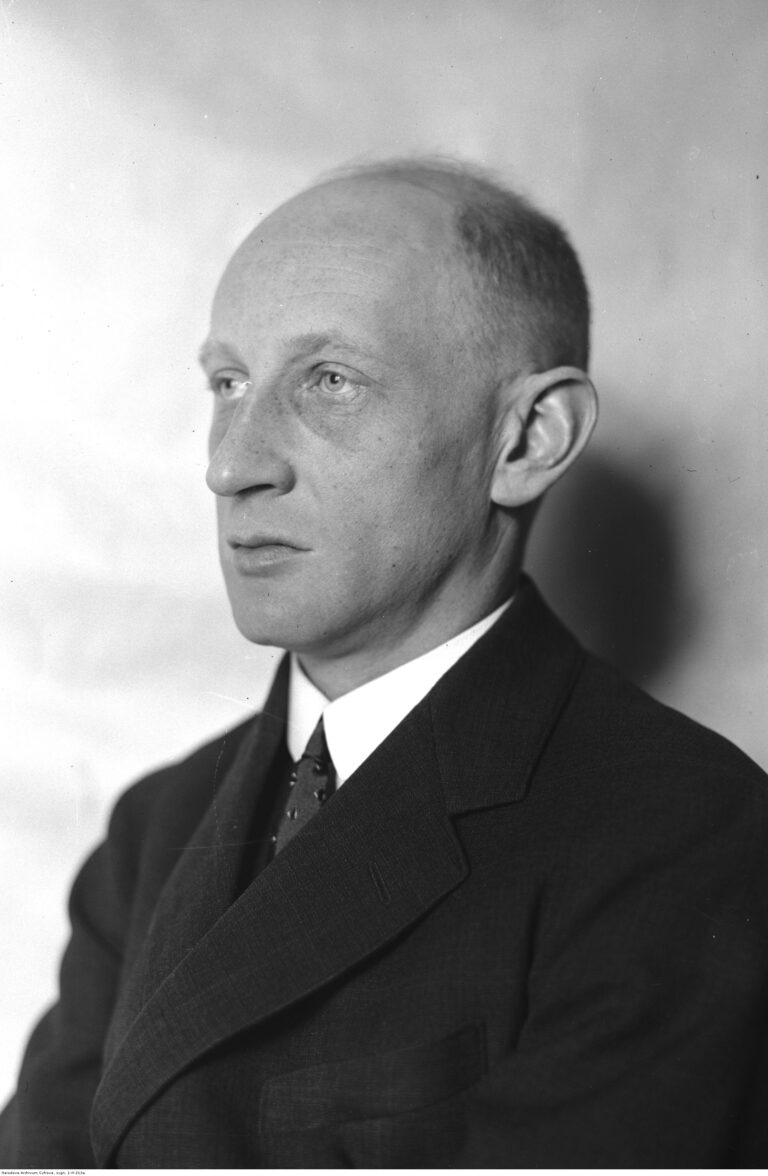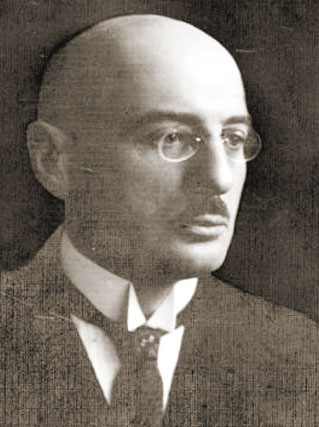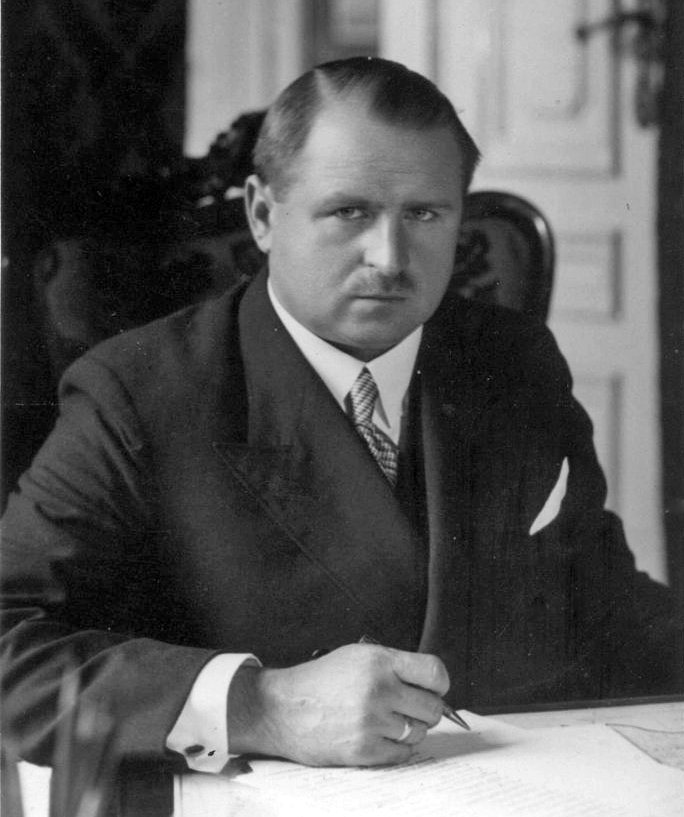CONTRIBUTION OF ECONOMISTS OF THE SECOND POLISH REPUBLIC TO THE DISCOURSE ON THE ROLE OF THE STATE IN THE ECONOMY

english version
Urszula Zagóra-Jonszta
University of Economics in Katowice

deutsche Fassung
INTRODUCTION
Polish economic thought in the period between the two world wars followed a clearly liberal course set by the Western school of thinking. This reflected, on the one hand, the popularity of liberal theories that were dominant in the West at the time and, on the other hand, the reluctant perception of the state as a foreign body, dating back to the times when Poland had been partitioned. During the period of partitions, many representatives of the Polish economic academia studied abroad where they absorbed either the theories of subjective marginalism or the concepts of the Younger Historical School. Interestingly, the Polish proponents of the latter were, at the same time, liberals even though that particular line of thinking advocated the agenda of state interventionism.
The role of the state in the economy was a heatedly debated matter throughout the interwar period. Representatives of the academia, business and government alike expressed their opinions on the subject in the economic literature, in the press, in parliamentary debates and on various forums, unanimously criticising excessive state interference. Only a small group of young economists had the courage to stand up for the idea of interventionism.
This paper discusses the views of representatives of economic academia and the younger generation of economists on the role of the state in the economy.
POLISH ECONOMIC ACADEMIA’S
VIEWS ON STATISM
Arguably, no other subject attracted so unanimously negative opinions from economic academics in the Second Polish Republic as state interventionism did. Particularly criticised was statism, a doctrine advocating the role of the state as an entrepreneur or banker and its participation in private enterprises. It was thought that the end of the war would mark a return to the pre-1914 liberal economy. Yet the world had changed and economic life was reoriented towards the development of the state sector. Poland’s situation was peculiar in that, after regaining independence, the state had taken over (ex officio, one may say) many of the former possessions of the partitioning states, which could not be privatised due to the weakness of domestic private capital. Moreover, the properties that passed into state hands were often heavily indebted or did not generate any revenue – but served social purposes. The state sector kept growing over the years despite attempts to undermine it. The growing gap between theory and practice ratcheted up the temperature of the debate, which became particularly heated in what became known as the period of discussion on statism in 1928-1931. It was a battle from which liberal economics emerged victorious.
The most ardent opponents of the state’s excessive role in the economy were recruited from among the representatives of the “Kraków school of economics”, a movement led by Professor Adam Krzyżanowski, a lecturer in economics at the Jagiellonian University. Other members included Adam Heydel, Ferdynand Zweig, Tomasz Lulek, Leon Oberlender, Stanisław Wyrobisz and Stefan Schmidt. That particular school of thought was also represented by Stanisław Głąbinski of the University of Lviv, Roman Rybarski of the University of Warsaw and Jan Stanislaw Lewinski of the Warsaw school of economics The origins of the Kraków school of economics dated back to the establishment of the Economic Society in 1921. Membership was open to anyone subscribing to the agenda of economic freedom. The Society’s primary statutory goal was to fight statism. Through its extensive publishing efforts, the Society pursued a mission of spreading economic knowledge among the public and shifting public opinion against excessive state interference in the economy. It is safe to say that Kraków’s economists more than earned the badge of the fiercest opponents of statism.
The doctrine of statism was blamed for all the failures of the economy and its origins were traced back to the legacy of the Partitions and the prolongation of the war economy in Poland as a result of the Polish-Bolshevik war. The weakness of private capital, the allegedly pro-socialist sympathies of government representatives and the passivity of a society subordinated for years to the decision-making of partitioning states were other factors mentioned.

Adam Krzyżanowski was one of the most vocal critics of statism, which he blamed for:
- – restriction of individual freedom and disincentive for creativity, excessive bureaucracy, excessive running costs of the state, concentration of production with the involvement of state capital, increase in interest rates and the passivity of the balance of trade,
- – excessive fiscalism leading to pauperisation of society and decapitalisation of assets,
- – economic slump,
- – the unprofitability of state economic activity,
- – limitation of democracy and decline in the moral level of society. Citing Adam Smith, he argued that a liberal state created fewer reasons for crime than a statist one. He even claimed that the decline of liberalism had led to the collapse of European civilisation.
Adam Krzyżanowski’s views were echoed by other representatives of the Kraków school. Using the theoretical example of two enterprises, Heydel argued that a manufacturer who produced less but was more profitable would bring more wealth to the society than one who produced more but was less profitable. He thus called into question the usefulness of state-owned enterprises, whose balance of operation he regarded as negative. So it did not even make sense to commercialise them. Lulek carried out an in-depth analysis of state-owned enterprises, putting stress on their poor financial performance and the slow commercialisation process which did not, moreover, bring any improvements to their profitability or transparency of operation.
Rybarski was another author to write about the unprofitability of state-owned enterprises. He complained about high production costs, excessive red tape and appointments to managerial positions that were politically rather than professionally motivated. He criticised the state for buying unprofitable or marginally profitable businesses out of private hands. This, he argued, was the reason why they should be reprivatised or liquidated. Rybarski also introduced the concept of police statism – that is the state’s exercise of power against the will of society – into the broader discourse on statism.

State-owned enterprises were accused of competing unfairly with the private sector and wasting resources that would be put to better use in private hands. Tadeusz Brzeski, a professor at the University of Warsaw associated with the historical school of economics, took a more tolerant stance towards state-owned enterprises. He advocated what he called a “developed liberalism”, representing a balance between free competition and coercion. He permitted the existence of state-owned enterprises if they filled the gap left by private companies or, through competition, forced them to act more rationally.
There were views that equated statism with socialism. It was the idea advocated by Krzyżanowski shortly after Poland had regained independence. Influenced by the theories of Ludwig von Mises, Heydel also argued that, if consistently applied, statism would lead to socialism. While lacking in substance, such views found resonance for political reasons.
Polish academics were hoping for the return of economic liberalism, which they regarded as a system of tolerance and freedom. According to Professor Edward Lipinski, it was “the healthiest principle of life in the capitalist system”.
He argued that the state “possesses neither the specific knowledge of the economic process, nor the appropriate executive bodies, nor can it become completely independent of the influence of group and class interests”.
Statism was regarded as the cause of the country’s economic underdevelopment. Henryk Korowicz, Rector of the Higher School of Foreign Trade in Lviv, claimed that “the mechanism of economic life has broken down because it was made to function anti-economically”. The government’s actions had forced out more liberal economic forms, introducing excessively anti-liberal policies. This brings to mind an analogy with the views of Lionel Robbins who accused an illogical practice of being unwilling to adapt itself to a logical theory.
Only two professors had the courage to proclaim different views. These were: Leopold Caro of the Lviv Polytechnic, a proponent of solidarism and corporatism, and Zofia Daszyńska-Golińska, a socialist. They were not, however, successful in making their voice heard by the public, which had been influenced primarily by the Kraków school of economics.
The post-crisis years and the policy of cautious economic stimulation, as part of which the government decided to build the Central Industrial District, led to the softening of the stance towards state interventionism. Wyrobisz stressed that the state could stimulate the economy through the recourse to – previously criticised – public works. Zweig went on a crusade to foster the proper understanding of interventionism by introducing the concept of liberal interventionism not conflicting with private initiative. He developed a plan to increase the profitability of state-owned enterprises, remedy the excesses of statism, eliminate permanent sources of financial support for enterprises and their thorough commercialisation. The uptake of new ideas among the professorship was, however, low. Poland’s greatest liberals were adamant in their refusal to permit the state to be a direct economic actor.
THE FIRST ECONOMIC BRIGADE’S VIEWS ON THE ECONOMIC ACTIVITY OF THE STATE
Representatives of the younger generation of economists under the leadership of Stefan Starzyński, the then Director of the General Department at the Treasury Ministry, took a different stance towards the active role of the state. They were aware of the deepening gap between economic theory and practice, but were initially too weak to make their voice heard. It was not until 1928 that two comprehensive works were published to commemorate the 10th anniversary of Poland’s recovery of independence. These were: Zagadnienia gospodarcze Polski współczesnej [Economic issues of contemporary Poland] and Na froncie gospodarczym. W dziesiątą rocznicę odzyskania niepodległości [On the economic front. The 10th anniversary of independence]. The same year saw the publication of Przemysł i Handel 1918-1928 [Industry and Trade 1918-1928] and Sprawozdanie Komisji Ankietowej [Report of the Survey Commission], in which a greater state interference was advocated. At the same time, Krzyżanowski published Bierny bilans handlowy [Passive trade balance], in which he strongly defended the anti-statist agenda. This increased publication activity sparked a spirited polemic exchange between 1928 and 1931. On the initiative of industrial and landowner circles, two conferences were held at the home of Prince Janusz Radziwiłł at the turn of 1928, with the participation of prominent representatives of liberal thought and the group Starzyński called the First Economic Brigade, emphasising the pioneering role they were to play in confronting orthodox economics. Erudition and experience of advocates of economic liberalism (a theory which, while coherent, bore little relevance to the reality) won out over enthusiasm and self-confidence of their opponents who, however, lacked a developed theory of state interventionism. Yet the proponents of the statist agenda did not lay down their arms. They actively engaged in journalism, laying the groundwork for a new theory, a task they did not, however, manage to complete by the end of the interwar period. Identifying the various sources of statism (the legacy of the partitions, the lack of interest of private capital in certain areas of activity and weaknesses of private enterprise), they argued that the state was required to take an active role in economic life. The statists accused business actors of two-facedness: on the one hand, they were criticising statism while on the other hand, they were demanding tax breaks, tax write-offs in times of crisis, government contracts, subsidies, export bonuses, etc. The Brigade defended the existence of state-owned enterprises by pointing out that their mission was to complement the activity of private capital, act as a pioneer paving the way for private enterprise and be present wherever the country’s security required. Gieysztor identified the three most important tasks of public enterprises: determining the actual working conditions in a particular branch, regulating prices and conditions of sale, and acting in pursuance of state interests. He believed a major evolution was taking place, with private and state-owned enterprises becoming increasingly similar to each other as a result of commercialisation of state-owned entities and monopolisation of private ones. The separation of capital-ownership from capital-function resulted in the weakening of the role of profit and the emergence of the position of director-manager; these were the developments that transformed the capitalist economy. However, these important insights were not used to build a theory of statism.
Drawing on the concept of marginalism, Ivanka’s model was an interesting example of the theoretical presentation of changes in the economic process. Ivanka argued that in Poland, where unemployment was high, the aim should be to maximise gross income rather than profit. This would, he claimed, create additional jobs in the areas that would otherwise be idle if made to function under the regime of free competition. The model itself had quite a few flaws (for example, it did not take into account the necessary changes in social infrastructure) but, importantly, it drew attention to the growth-driving role of the state sector.
Just before the May coup, Starzyński presented the government’s economic programme, the main idea of which was to activate the state economy. It comprised the following propositions:
- widespread labour rationalisation,
- fighting corruption and fraud,
- reforming the administration and reducing bureaucracy,
- introducing a bullion-based currency,
- reforming banks (creating long-term credit and reducing interest rates),
- activating exports,
- land reform,
- state control over industrial production,
- achieving a balanced budget (which Starzyński considered the most important task).
Two years later, as the leader of the Brigade and a great supporter of the Sanation movement, he softened his stance and reduced his propositions to maintaining a balanced budget, stabilising the currency and developing the state sector.

In defending the government’s policies, Brigade members raised the argument that the war had led to an increase in state interventionism. The war gave birth to many new countries, and the process of democratisation created new economic problems that had to be tackled by the state. They stressed that there were areas of life that private capital was reluctant to enter and which it preferred to leave to the state. They argued that the private sector and the state were in fact complementary. Disagreeing with the claim that state-owned enterprises were unprofitable, they argued that their performance should not be assessed in terms of the profit they made because they were tasked to fulfil other goals; and besides, many of them were profitable, state forests being one example. They often called economic circles to account, pointing out that they first forced the government to develop a regime of statism, only to later disparage it for doing so.
The criticism of the Sanation governments intensified as a result of the severity of the Great Economic Crisis. Moreover, the Brigade’s acceptance of central planning made it prone to accusations of tilting towards socialism. As a result, the statists were busy refuting the allegations, which distracted them from their main task of creating a new theory. In addition, while criticising the tenets of neoclassical economics, they often were in fact acting contrary to what they preached. For example, Starzyński, while ostensibly a statist, was a classic in the field of fiscal and monetary policy during the crisis years, advocating a policy of budget balancing and monetary stabilisation.
In 1931, Starzyński left the Ministry and the Brigade ceased to exist. However, it must be credited with significant achievements, such as drawing attention to the gap between theory and practice, as well as initiating a new line of thinking (although without creating a new theory) that was to be followed up by its successor, the National Economy Club, which was joined by many former Brigade members.
SUMMARY
Economic thinking in the interwar period was dominated by a liberal approach. This was due to several factors: the attachment of academics to the views they had cultivated for years, the desire to maintain good relations with the industrial sphere (many professors were members of companies’ supervisory boards), the vagueness of the statist concepts of the younger generation of economists and the lack of a theoretical model that could compete with the neoclassical one. The freshness of the outlook and the unconventionality of views were a great advantage of the proponents of the state’s active role in the economy. However, the statists themselves admitted years later that their views were eclectic: on the one hand, they recognised the necessity of an increased economic role of the state, while on the other, sometimes unconsciously, they stood by the liberal economics they themselves criticised.
ABOUT AUTHOR

Urszula Zagóra-Jonszta: an economist specialising in the history of economic thought, economic history of the Second Polish Republic, problems of globalisation, and contemporary economic theories. Author of about 300 publications (monographs and chapters in monographs, articles, papers, scripts), including Spory o model gospodarki Drugiej Rzeczypospolitej: problemy etatyzmu, planowania i kartelizacji [Disputes on the economic model of the Second Polish Republic: problems of statism, planning and cartelisation] (Katowice 1991), Etatyzm w polskiej myśli ekonomicznej Górnego Śląska 1922-1939 [Statism in the Polish economic thought of Upper Silesia in 1922-1939]] (Wrocław 1996).
Przypisy
1 B. Urbankowski, Józef Piłsudski. Marzyciel i strateg, Poznań 2014; A. Garlicki, Józef Piłsudski, 1867–1935, Warszawa 1990; K. Kawalec, op. cit.; R. Wapiński, Roman Dmowski, Lublin 1988.
2 M. M. Drozdowski, Ignacy Jan Paderewski, Warszawa 1981; H. Przybylski, Paderewski. Między muzyką a polityką, Katowice 1992; I. J. Paderewski, Pamiętniki, Kraków 1961.
3 A. Bujak, M. Rożek, Wojtyła. Wrocław 1997; ks. M. Maliński, Droga do Watykanu. Wydawnictwo Literackie 2005; G. Weigel, Świadek nadziei, Kraków 2000; P. Zuchniewicz, Narodziny pokolenia JP2. Warszawa 2007.
4 R. W. Reid, Marie Curie. London 1974; F. Giroud: Maria Skłodowska-Curie, Warszawa 1987; S. Quinn, Życie Marii Curie. Warszawa 1997; M. Skłodowska-Curie, Autobiografia i wspomnienia o Piotrze Curie. Warszawa 2004.
5 S. M. Jankowski, Karski. Raporty tajnego emisariusza, Poznań 2009; W. Piasecki, Jan Karski. Jedno życie, t. 1-2, Kraków 2015-2017; E. T. Wood, Karski. Opowieść o emisariuszu, Kraków 1996; A. Żbikowski, Karski, Warszawa 2011.
6 A. Cyra, Rotmistrz Pilecki. Ochotnik do Auschwitz, Warszawa 2014; Auschwitz. Nazistowski obóz śmierci, red. F. Piper i T. Świebocka, Oświęcim-Brzezinka 1993.
A project financed from the funds of the Chairman of the Council of Ministers the Republic of Poland within the framework of the 2022 Polonia and Polish People abroad competition
